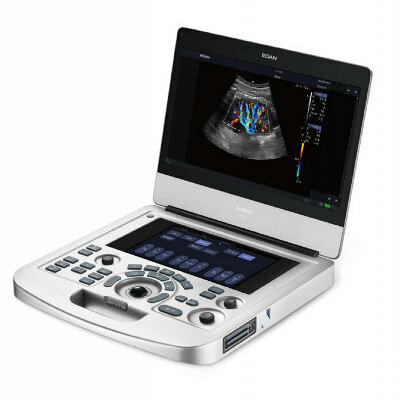Dedicated MRI System Scans Neonates Inside NICU
|
By MedImaging International staff writers Posted on 24 Dec 2018 |

Image: The Embrace Neonatal MRI System inside a NICU (Photo courtesy of Aspect Imaging).
A compact magnetic resonance imaging (MRI) system designed to be placed inside the neonatal intensive care unit (NICU) reduces the risks involved with transporting infants to an external facility.
The Aspect Imaging (Shoham, Israel) Embrace Neonatal MRI System is a fully enclosed device that does not require a safety zone or shielded room, and can thus be placed inside a NICU environment. Babies undergoing scans are placed inside a temperature-controlled self-contained incubator bed, which minimizes movement while allowing for environmental control and continuous monitoring of its vital signs. Information gained from the MRI can identify possible brain injury, and in the future guide, which treatments may assist in preventing disability.
System features include a workflow that allows prep and scan in less than one hour of neonates with a head circumference up to 38 centimeters and weight between one and 4.5 kilograms; a dedicated head coil enabling diagnostic quality brain imaging; three size swaddles to reduce infant movement and allow routing of tubing and monitoring leads; a non-cryogenic technology that does not require a cooling system; and PACS/HIS/RIS connectivity with DICOM compatibility. The system is contraindicated for all infants with metallic or electronically active implants.
“The operating and maintenance costs of the Embrace Neonatal MRI System are much lower than conventional superconductor MRIs due to Aspect's magnet technology, which requires no cooling system and has low power consumption,” said Uri Rapoport, CEO and Founder of Aspect Imaging. “Our vision is to help the most vulnerable population of all – premature babies – using our technology to assist neonatologists with their clinical diagnoses, and improve neonatal care wherever it will be used.”
“The installation of the state-of-the-art, neonatal MRI system will greatly enhance the research capabilities of Brigham and Women’s Hospital, and elevate and expand neurocritical care for our littlest patients,” said Terrie Inder, MD, chair of the department of pediatric newborn medicine, which installed the first Embrace device in the USA. “Locating this technology within the NICU will reduce time and patient risk associated with transporting newborns to a traditional MRI and allow MRI access from the first hours of life through the challenging, sometimes life threatening, time within the NICU.”
Related Links:
Aspect Imaging
The Aspect Imaging (Shoham, Israel) Embrace Neonatal MRI System is a fully enclosed device that does not require a safety zone or shielded room, and can thus be placed inside a NICU environment. Babies undergoing scans are placed inside a temperature-controlled self-contained incubator bed, which minimizes movement while allowing for environmental control and continuous monitoring of its vital signs. Information gained from the MRI can identify possible brain injury, and in the future guide, which treatments may assist in preventing disability.
System features include a workflow that allows prep and scan in less than one hour of neonates with a head circumference up to 38 centimeters and weight between one and 4.5 kilograms; a dedicated head coil enabling diagnostic quality brain imaging; three size swaddles to reduce infant movement and allow routing of tubing and monitoring leads; a non-cryogenic technology that does not require a cooling system; and PACS/HIS/RIS connectivity with DICOM compatibility. The system is contraindicated for all infants with metallic or electronically active implants.
“The operating and maintenance costs of the Embrace Neonatal MRI System are much lower than conventional superconductor MRIs due to Aspect's magnet technology, which requires no cooling system and has low power consumption,” said Uri Rapoport, CEO and Founder of Aspect Imaging. “Our vision is to help the most vulnerable population of all – premature babies – using our technology to assist neonatologists with their clinical diagnoses, and improve neonatal care wherever it will be used.”
“The installation of the state-of-the-art, neonatal MRI system will greatly enhance the research capabilities of Brigham and Women’s Hospital, and elevate and expand neurocritical care for our littlest patients,” said Terrie Inder, MD, chair of the department of pediatric newborn medicine, which installed the first Embrace device in the USA. “Locating this technology within the NICU will reduce time and patient risk associated with transporting newborns to a traditional MRI and allow MRI access from the first hours of life through the challenging, sometimes life threatening, time within the NICU.”
Related Links:
Aspect Imaging
Latest MRI News
- PET/MRI Improves Diagnostic Accuracy for Prostate Cancer Patients
- Next Generation MR-Guided Focused Ultrasound Ushers In Future of Incisionless Neurosurgery
- Two-Part MRI Scan Detects Prostate Cancer More Quickly without Compromising Diagnostic Quality
- World’s Most Powerful MRI Machine Images Living Brain with Unrivaled Clarity
- New Whole-Body Imaging Technology Makes It Possible to View Inflammation on MRI Scan
- Combining Prostate MRI with Blood Test Can Avoid Unnecessary Prostate Biopsies
- New Treatment Combines MRI and Ultrasound to Control Prostate Cancer without Serious Side Effects
- MRI Improves Diagnosis and Treatment of Prostate Cancer
- Combined PET-MRI Scan Improves Treatment for Early Breast Cancer Patients
- 4D MRI Could Improve Clinical Assessment of Heart Blood Flow Abnormalities
- MRI-Guided Focused Ultrasound Therapy Shows Promise in Treating Prostate Cancer
- AI-Based MRI Tool Outperforms Current Brain Tumor Diagnosis Methods
- DW-MRI Lights up Small Ovarian Lesions like Light Bulbs
- Abbreviated Breast MRI Effective for High-Risk Screening without Compromising Diagnostic Accuracy
- New MRI Method Detects Alzheimer’s Earlier in People without Clinical Signs
- MRI Monitoring Reduces Mortality in Women at High Risk of BRCA1 Breast Cancer
Channels
Radiography
view channel
Novel Breast Imaging System Proves As Effective As Mammography
Breast cancer remains the most frequently diagnosed cancer among women. It is projected that one in eight women will be diagnosed with breast cancer during her lifetime, and one in 42 women who turn 50... Read more
AI Assistance Improves Breast-Cancer Screening by Reducing False Positives
Radiologists typically detect one case of cancer for every 200 mammograms reviewed. However, these evaluations often result in false positives, leading to unnecessary patient recalls for additional testing,... Read moreUltrasound
view channel
Deep Learning Advances Super-Resolution Ultrasound Imaging
Ultrasound localization microscopy (ULM) is an advanced imaging technique that offers high-resolution visualization of microvascular structures. It employs microbubbles, FDA-approved contrast agents, injected... Read more
Novel Ultrasound-Launched Targeted Nanoparticle Eliminates Biofilm and Bacterial Infection
Biofilms, formed by bacteria aggregating into dense communities for protection against harsh environmental conditions, are a significant contributor to various infectious diseases. Biofilms frequently... Read moreNuclear Medicine
view channel
New SPECT/CT Technique Could Change Imaging Practices and Increase Patient Access
The development of lead-212 (212Pb)-PSMA–based targeted alpha therapy (TAT) is garnering significant interest in treating patients with metastatic castration-resistant prostate cancer. The imaging of 212Pb,... Read moreNew Radiotheranostic System Detects and Treats Ovarian Cancer Noninvasively
Ovarian cancer is the most lethal gynecological cancer, with less than a 30% five-year survival rate for those diagnosed in late stages. Despite surgery and platinum-based chemotherapy being the standard... Read more
AI System Automatically and Reliably Detects Cardiac Amyloidosis Using Scintigraphy Imaging
Cardiac amyloidosis, a condition characterized by the buildup of abnormal protein deposits (amyloids) in the heart muscle, severely affects heart function and can lead to heart failure or death without... Read moreGeneral/Advanced Imaging
view channel
New AI Method Captures Uncertainty in Medical Images
In the field of biomedicine, segmentation is the process of annotating pixels from an important structure in medical images, such as organs or cells. Artificial Intelligence (AI) models are utilized to... Read more.jpg)
CT Coronary Angiography Reduces Need for Invasive Tests to Diagnose Coronary Artery Disease
Coronary artery disease (CAD), one of the leading causes of death worldwide, involves the narrowing of coronary arteries due to atherosclerosis, resulting in insufficient blood flow to the heart muscle.... Read more
Novel Blood Test Could Reduce Need for PET Imaging of Patients with Alzheimer’s
Alzheimer's disease (AD), a condition marked by cognitive decline and the presence of beta-amyloid (Aβ) plaques and neurofibrillary tangles in the brain, poses diagnostic challenges. Amyloid positron emission... Read more.jpg)
CT-Based Deep Learning Algorithm Accurately Differentiates Benign From Malignant Vertebral Fractures
The rise in the aging population is expected to result in a corresponding increase in the prevalence of vertebral fractures which can cause back pain or neurologic compromise, leading to impaired function... Read moreImaging IT
view channel
New Google Cloud Medical Imaging Suite Makes Imaging Healthcare Data More Accessible
Medical imaging is a critical tool used to diagnose patients, and there are billions of medical images scanned globally each year. Imaging data accounts for about 90% of all healthcare data1 and, until... Read more
Global AI in Medical Diagnostics Market to Be Driven by Demand for Image Recognition in Radiology
The global artificial intelligence (AI) in medical diagnostics market is expanding with early disease detection being one of its key applications and image recognition becoming a compelling consumer proposition... Read moreIndustry News
view channel
Bayer and Google Partner on New AI Product for Radiologists
Medical imaging data comprises around 90% of all healthcare data, and it is a highly complex and rich clinical data modality and serves as a vital tool for diagnosing patients. Each year, billions of medical... Read more



















